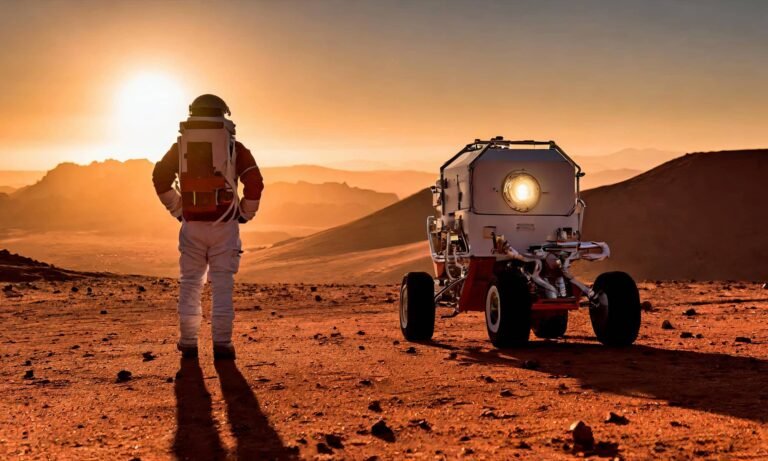Space exploration is undergoing a major shift with the rise of the New Space Age. Once led solely by government agencies like NASA and ESA, the field is now rapidly expanding through private companies. Since the early 2000s, firms like SpaceX have driven innovation by lowering launch costs and attracting investment, proving that the private sector can play a central role in space missions. This commercialization has unlocked new possibilities – from satellite internet to lunar missions and plans for Mars. Private ventures are not just supporting but often surpassing public efforts, drawing in entrepreneurs, researchers, and investors. As this dynamic era unfolds, the growing role of privatization is reshaping our future in space.
Key Players in the Commercial Space Industry
The commercialization of space is increasingly shaped by several key players, each contributing distinct advancements and visions for the future of space exploration.
- Foremost among these companies is SpaceX, founded by Elon Musk in 2002. SpaceX has made significant strides through its focus on reducing the costs associated with space travel. The launch of the Falcon 1 marked a pivotal moment, as it was the first privately developed liquid-fueled rocket to reach orbit. SpaceX’s ongoing mission centers on the colonization of Mars, and its Starship vehicle aims to facilitate not only interplanetary travel but also regional transportation on Earth, fundamentally reshaping access to space.
- Blue Origin, established by Jeff Bezos, has also emerged as a formidable competitor. The company envisions millions of people living and working in space. Blue Origin’s New Shepard suborbital vehicle has successfully conducted multiple uncrewed flights, demonstrating reusable rocket technology and aiming to support space tourism. Moreover, its New Glenn orbital launch vehicle, anticipated to make its debut in the coming years, reflects the company’s purpose to provide reliable and cost-effective access to both low Earth orbit and beyond.
- Another notable entity is Virgin Galactic, led by Richard Branson. The company has focused on the burgeoning space tourism market. Virgin Galactic’s SpaceShipTwo has completed several test flights, showcasing its potential to take paying customers on suborbital flights. This shift towards space tourism represents a significant move towards making space accessible to the general public, not merely elite scientists or astronauts.
These three companies, along with others, are redefining the boundaries of space activity, and their innovations could pave the way for new industries and opportunities in the vast expanse beyond our planet.
Economic Opportunities in Outer Space
The privatisation of space has ushered in a new era of economic opportunities that promise to transform industries and generate substantial revenue streams.
One of the most prominent avenues for commercialisation is satellite internet. Companies such as SpaceX and OneWeb are expanding high-speed internet access to remote and underserved areas across the globe.
This market not only has the potential to enhance connectivity for millions but also holds significant financial incentives for private investors looking to capitalize on it.
Asteroid mining is another emerging venture, offering access to valuable resources like gold, platinum, and water. Though still in early stages, it holds the potential to reduce resource scarcity and lower costs for future space missions, making it a promising long-term investment.
Space tourism is gaining momentum, with companies like Blue Origin and Virgin Galactic offering suborbital flights. As technology advances and costs decrease, this luxury experience could evolve into a major sector of the space economy.
Overall, space commercialization is about more than profit – it’s about Value Creation as it’s driving innovation, sustainability, and global connectivity, with ripple effects across industries on Earth
Regulatory Framework for Privatized Space Operations
The rise of commercial space activity has led to the creation of a robust regulatory framework, built on international treaties, national laws, and government oversight. Central to this is the 1967 Outer Space Treaty which promotes peaceful exploration for the benefit of all and bans territorial claims in space.
Countries like the U.S. have added national regulations to manage private space ventures. The FAA, for example, licenses commercial launches and ensures public safety. NASA also plays a key role through programs like the Commercial Crew Program, setting safety standards and fostering public-private partnerships.
Together, these regulations balance innovation with safety, enabling private companies to explore space responsibly within a structured legal system.
Technological Innovations Driving Space Privatization
Technological breakthroughs are driving the shift toward privatized space exploration. Reusable rockets – like SpaceX’s Falcon 9 – have slashed launch costs and increased mission frequency, making space more accessible and commercially viable.
Miniaturized satellites, such as CubeSats, have also lowered entry barriers, enabling startups and research groups to join the space race. Meanwhile, AI and machine learning are streamlining mission planning and data analysis, boosting efficiency for private operators.
Together, these innovations are accelerating space commercialization and attracting investment, setting the stage for a new era of exploration and discovery.
Challenges and Risks of Privatizing Space
The privatization of space brings significant challenges. These issues highlight the urgent need for oversight to ensure safety, fairness, and sustainability in space.
- Safety is a major concern, as some private companies may cut corners to reduce costs, increasing the risk of accidents and undermining public trust.
- There’s also the threat of monopolies, with a few dominant firms potentially controlling key aspects of space access and stifling competition. Without strong regulation, smaller players may struggle to compete.
- Environmental risks are growing too – more launches mean more pollution and Space Debris, while resource extraction raises ethical concerns.
Space as a Resource: Ethical Considerations
As space exploration expands, ethical concerns grow.
- One key issue is inequality – wealthy nations and corporations may dominate access to space resources like lunar water or asteroid minerals, deepening global disparities. This raises the question: should space resources be a shared right for all humanity?
- Space has long been seen as a global commons, guided by treaties like the 1967 Outer Space Treaty. But with private companies entering the scene, maintaining this principle becomes more challenging. There’s a risk of space exploitation mirroring colonialism if not carefully regulated.
- Militarization is another concern. Rising competition among nations could turn space into a conflict zone, threatening global security. To avoid this, we must uphold ethical standards that prioritize cooperation, equity, and peace in the cosmos.
The Future of Space Privatization: Trends and Predictions
Space exploration is rapidly evolving due to privatization, with key trends pointing toward stronger public-private partnerships (PPPs) and international cooperation. Governments are increasingly teaming up with private firms – like in NASA’s Commercial Crew Program – to share innovation, funding, and risk.
Global collaboration is also growing, with agreements like the Artemis Accords promoting joint efforts in lunar and Martian exploration. Meanwhile, advances in reusable rockets and satellite tech are lowering costs, enabling more companies to enter the market with services like satellite internet and space tourism.
Together, these shifts signal a future where private industry plays a central role in a more collaborative, accessible, and innovative space economy.
What’s More
The posts in My Blog feature reflective, story-driven pieces rooted in personal and societal insights.
The topics in My Interests explore abstract, philosophical ideas and their cultural and societal impact.
👁️ 6,526 Views














